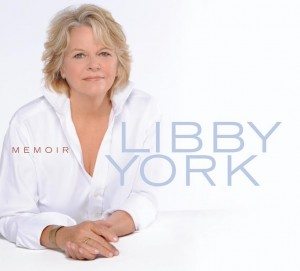
 It’s hard to imagine a voice more suited to classic jazz standards than that of Libby York. Listening to this throaty, laid-back chanteuse easing her way through “Take Me Back To Manhattan”, you can almost see the cigarette smoke and catch the aroma of spilled bourbon in a beautifully lived-in jazz club, the kind that perhaps no longer exists.
It’s hard to imagine a voice more suited to classic jazz standards than that of Libby York. Listening to this throaty, laid-back chanteuse easing her way through “Take Me Back To Manhattan”, you can almost see the cigarette smoke and catch the aroma of spilled bourbon in a beautifully lived-in jazz club, the kind that perhaps no longer exists.
In its best moments, York’s new album, "Memoir", sounds like something the singer and her damn talented companions did for themselves, not caring too much whether anyone else might wander into the joint. They toss back some more gin and pick it up again, vibrating with soul as the clock on the wall eases its way towards two in the morning. The record starts off strong with a witty performance of “Give Me The Simple Life”. It’s jaunty, effortless, and as in so many of the tracks on "Memoir" made all the more enjoyable by York’s generous habit of passing it off to her mates for a few bars. After they add their own delectable flourishes, it’s all the more pleasurable when she comes back in again.
Strong, too, is the eminently recognizable tune “Thanks For The Memories”, a stoic, smiling-through-the-tears tune that was unfortunately made corny and insipid by its decades-long warbling by Bob Hope. She reminds us what a great meditation it is, a happy/sad reflection on a relationship long gone. It’s truly a classic, and York’s is the best rendition I’ve heard in years.
York is justly known for her great control and confident phrasing. She also has the ability to create a vocal shade that implies a broad grin while she sings. It’s occasionally charming, sometimes a bit much, but in the best tracks on this album, she sets this aside and bares her heart.
The most disappointing track is the Crosby tribute “Put It There, Pal”, a duet sung with Warren Vache in which most of the time is spent exchanging cutesy banter such as “Shall we dance? …No, I got my girdle on tonight!” and other Bing-esque jibes. When Louis Armstrong and other singers made this kind of thing work, it was because it was spice, not the whole dish. Somewhat less interesting, too, is “My Little Boat”, a fairly obscure and forgettable song. But the weaker songs are not only few, but also mercifully short, whereas the best songs are given a lot of time.
The best performance on the album, the Gershwin classic “How Long Has This Been Going On?”, is simply magnificent, an aching rendition that really takes its time, and in this song York is at her most vulnerable. In fact, it is the vulnerability in her voice that is most gripping. It’s even more appealing than the laid-back confidence she has in spades. It moves the listener into a poetic and gorgeously melancholy realm that is simply blissful. Confidence is great in jazz, but vulnerability and heartache is what gives it its beautiful sting.
I cannot find fault with any of the playing of York’s mates, and she gives them plenty of play time. Vache is truly great on the cornet, often pained and reflective, and John DiMartino appears in many of "Memoir’s" numbers with delicate piano playing that is a perfect accompaniment to York’s vocals. When these musicians match her sensitivity and ache, "Memoir" really glows. The rest of the time it’s still a fine evening in a great old club off a rainy street sometime close to two am.
New album to be released 3/24.